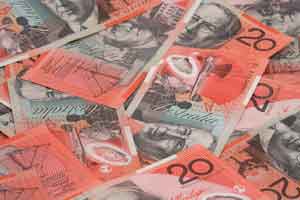Pound Australian Dollar Exchange Rate Forecast, News: GBP/AUD Flat On Mixed UK Jobs Data

At the time of writing GBP/AUD was trading at AU$1.9265. Virtually unchanged from the start of Tuesday’s trading session.
The Pound (GBP) faced resistance on Tuesday morning, following the publication of the UK’s latest jobs report.
According to data published by the Office for National Statistics (ONS), unemployment in the UK unexpectedly rose in April, climbing from 4.3% to 4.4%, its highest level in two and a half years.
Worryingly this was the fourth consecutive rise in unemployment and is a sign that the UK’s post-pandemic recovery may already run its course.
Nye Cominetti, principal economist at the Resolution Foundation, commented: ‘The labour market has continued to cool in early 2024, with both unemployment and inactivity up. Worryingly, the UK employment is closer to its mid-pandemic lows, than its pre-pandemic highs’.
However, the accompanying wage growth figures made more for positive reading for GBP investors. The ONS reporting that regular pay continued to rise by 6%, leading to real wages rising at their fastest pace since 2021 as inflation cooled sharply in April.
Taken together, analysts suggest the mixed UK jobs report is ‘unlikely to move the dial’ regarding the Bank of England’s (BoE) thinking on interest rates.
Consensus estimates still see the BoE holding off until at least August before beginning to cut interest rates, which may have helped to arrest losses in the Pound on Tuesday morning.
Luke Bartholomew, deputy chief economist at Abrdn, said: ‘UK wage growth remains very strong, but with further evidence that the labour market is cooling, this report is unlikely to significantly change the thinking at the Bank of England.
‘We expect the first rate cut in August, but that is dependent on further progress on bringing down underlying inflation pressure over the next few months.’
Australian Dollar (AUD) Dented by Decline in Business Confidence
The Australian Dollar (AUD) struggled to attract any meaningful support on Tuesday, after data showed that Australian business confidence turned negative last month.
The latest survey from National Australia Bank (NAB) reported that sentiment deteriorated in May, with falls in conditions in most consumer-facing sectors being particularly notable.
Businesses also raised concerns over rising inflation, which is both placing cost pressures on firms and sapping consumer spending.
Alan Oster, NAB’s chief economist, commented: ‘We have been wary for some time that the path of inflation from here is likely to be gradual and uneven, and the survey results really reinforce this message.’
outlook on
GBP/AUD Exchange Rate Forecast: Stalling UK Growth to Drag on Sterling?
Looking ahead, the Pound to Australian Dollar (GBP/AUD) exchange rate could come under pressure in mid-week trade with the publication of the UK’s latest GDP figures.
Economists predict that April’s monthly growth figures will report the UK economy stalled at the start of the second quarter. Could a slowdown place more pressure on the BoE to start loosening its monetary policy and sap Sterling sentiment in the process?
Meanwhile, the publication of Australia’s own jobs report will be the main focus for AUD investors in the second half of the week.
Forecast that unemployment will have fallen last month may offer some support to the ‘Aussie’, but only if the jobs added are for full-time positions, following a shock drop in April.
Related
Llyods Recruiting Engineers In India After Slashing Jobs In UK
Lloyds Banking Group is planning to hire hundreds of engineers in India as the company plans to shift its employment opportunit
Major new funding for music acts that supercharged careers of…
£1.6m Music Export Growth Scheme to support 58 independent UK artists to tour the world Funding will boost UK’s creative industries – a key growth se
Well-loved restaurant chain to close 8 venues across UK as…
A BELOVED restaurant chain has announced it will close eight venues across the UK, scrapping 158 jobs in the process.Owners are pointing the finger at Labour's
US adds 151,000 jobs in February as unemployment rate ticks…
The latest figures published by the US Bureau of Labor Statistics today (7 March) came in below market expectations, with economists polled by













